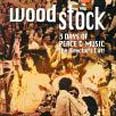
It is double "chai" (36 years) since the epochal Woodstock Music and Arts Fair in the upstate New York town of Bethel (No, it wasn't in Woodstock, itself) and some of the lyrics of those days have been playing themselves in my head.
It's most likely that Jefferson Airplane's members were not thinking of kabbalah, the Jewish people and the situation in Israel when they released the brilliant album "Crown of Creation" in the months before Woodstock, but the title track, one of the most heavily played songs of those days, is oddly appropriate to these disturbing times in Israel as D-Day (Disengagement from Gaza Day) is upon us.
The song begins, in Airplane's typical anthemic style, with the lyrics, "You are the crown of creation." I have been listening to this song on regular drives the length and breadth of Israel in recent days, and the lyric to me seems to define one view of the Jewish people - and the problems inherent in being a "crown of creation."
For as Grace Slick delivers the lyric, she wails: "You are the crown of creation, and you've got no place to go."
She then sings about attaining "the stability you strive for," but notes that "the only way that it's granted" is "in a place among the fossils of our time."
No tolerance
Slick, like the rest of those who populated Woodstock in the Age of Aquarius, knew that change was the only constant. Sticking to the status quo was a recipe for disaster then, as it is nowadays.
The lyrics continue their eerie assessment of our current situation:
"In loyalty to their kind, they cannot tolerate our minds. In loyalty to our kind, we cannot tolerate their obstruction."
Slick may have been singing of the pending battles between the hippies and the "straights" in turn-of-the-70s America, but to me she is singularly identifying the rift in Israel between the settler movement and the rest of the country. Neither side seems willing or able to understand or even tolerate the other.
The song's minimalist lyrics close with a return to the theme about how change is the only constant: "Life is change. How it differs from the rocks. I've seen their ways too often for my liking."
The "rocks" among us want everything to stay as it was, regardless of the change in the situation, regardless of the fact that everything always changes, and nothing can stay untouched by it. Sometimes they're even willing to throw rocks, slash tires or chain themselves inside fences to remain rocks.
Managing change
"New worlds to gain; my life is to survive, and be alive…for you," Slick calls out at the end - a plea to look to the future, to focus on the essential elements - to survive, to be alive, and to do it for the right reason - love, and the person next to you in the morning.
The Jewish people, and indeed, Israel, have been about understanding, managing and dealing with change for more than 2,000 years. In the 57 years of its existence, and in the 100 or so years that it has been in the modern Jewish imagination, Israel has been about making change; standing pat would not have resulted in the state's creation.
Stubbornness is one thing; without it, there would be no state. But standing pat today, and offering no good reason for doing so other than the blanket belief that change is bad, is a sure recipe for disaster.
Those who stand in the way of the flow are likely to get washed away. We who make our own change will surely deserve to be the "crowns of creation" envisioned in the ancient days.















